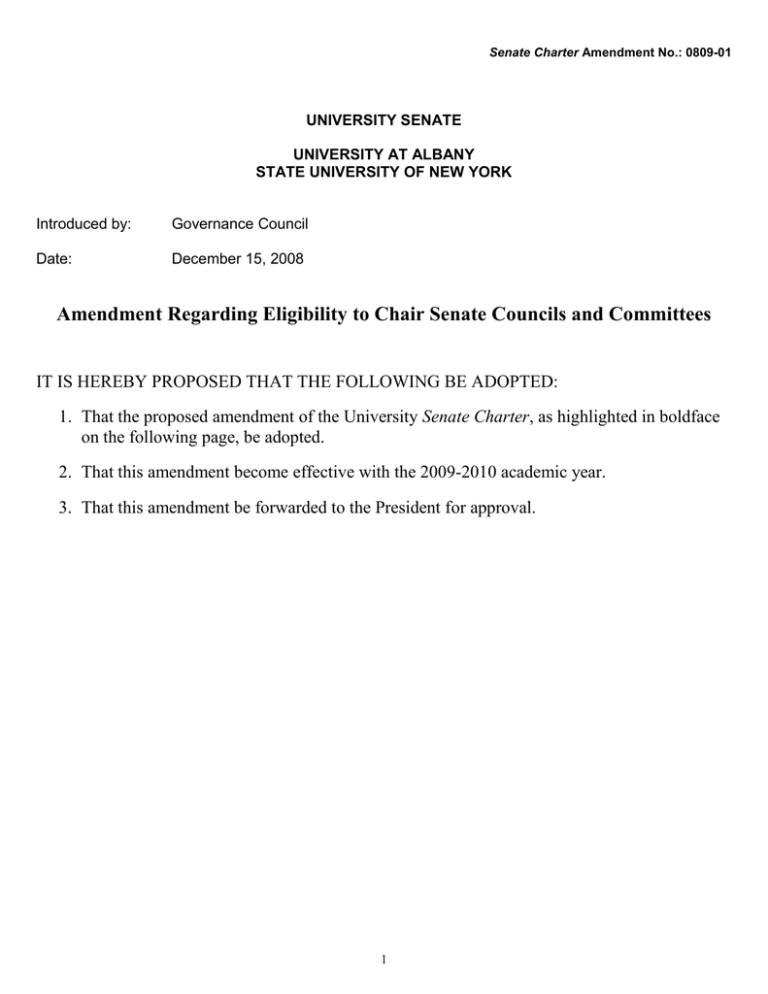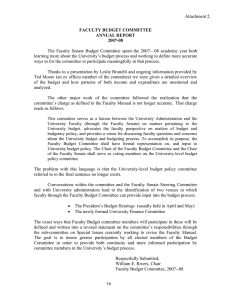Senate Charter Amendment re: Eligibility to Chair Senate Councils and Committees
advertisement

Senate Charter Amendment No.: 0809-01 UNIVERSITY SENATE UNIVERSITY AT ALBANY STATE UNIVERSITY OF NEW YORK Introduced by: Governance Council Date: December 15, 2008 Amendment Regarding Eligibility to Chair Senate Councils and Committees IT IS HEREBY PROPOSED THAT THE FOLLOWING BE ADOPTED: 1. That the proposed amendment of the University Senate Charter, as highlighted in boldface on the following page, be adopted. 2. That this amendment become effective with the 2009-2010 academic year. 3. That this amendment be forwarded to the President for approval. 1 Senate Charter Amendment No.: 0809-01 PROPOSED SENATE CHARTER AMENDMENT 0809-01 Section VIII: Council Structure and Operation VIII.1. Each Senator, except ex officio Senators, ordinarily must serve on a council. VIII.3. Council chairs VIII.3.1. Unless otherwise specified, each council shall elect a chair from among its eligible members. VIII.3.1.1. Persons or their designees who are ex officio members of a Senate council by virtue of their title or position in the University administration are not eligible to be elected either as chair of that council or as chair of a standing committee or subcommittee of that council. This does not preclude such an individual’s serving as chair of an ad hoc committee. VIII.3.3. As stated in Article II Section 6.3 of the Bylaws, council chairs must be Senators. If a council is unable to elect a chair from among its Senators, it may nominate its chair-elect to be appointed for a one-year term as a Senator by the approval of the Senate. VIII.3.7. Council chairs are responsible for ensuring that VIII.3.7.1. councils meet on a regular basis. VIII.3.7.2. councils fulfill their charges in a timely manner. VIII.3.7.3. in fulfillment of their respect charges, councils effectively balance their attention to routine business and broader policy issues. VIII.3.7.4. council work engages council members to contribute fully and develops governance leadership. VIII.3.8. Council chairs serve on the Executive Committee and on the Committee on Council Nominations of Governance Council. VIII.5. Committees: Councils may create committees and subcommittees. Typically, every member of the council, except ex officio members, shall serve on a committee. VIII.5.3. Unless otherwise specified, the chair of the committee shall be elected by the committee, from among the eligible council members on the committee. VIII.5.3.1. Persons or their designees who are ex officio members of a Senate council's standing committee or subcommittee by virtue of their title or position in the University administration are not eligible to be elected chair of that standing committee or subcommittee. VIII.5.4. It shall be clearly specified in the committee charge what actions are delegated to the committee, and all such actions are to be subject to the approval of the council as a whole. Committees may also be empowered to gather information for the council and to recommend action to the council. VIII.5.5. Reports of committee meetings and their actions and recommendations shall be provided in writing to the council by the committee chair and, once accepted by the council, shall be part of the council minutes. X.8. COUNCIL ON LIBRARIES, INFORMATION SYSTEMS AND COMPUTING X.8.1. Composition X.8.1.1. The Chief Information Officer, ex officio X.8.1.2. The Dean and Director of University Libraries, ex officio X.8.1.3. The Director of the Institute for Teaching, Learning & Academic Excellence, ex officio X.8.2. The Council shall review plans and recommend policies for the development and operation of informational systems and technology and library facilities and usage on each campus of the University. X.8.3. The Council shall have two standing committees. X.8.4. The Library Committee X.8.4.1. The Committee shall consist of at least 6 but not more than 8 members, with at least 3 from the Council, including the Director of the University Library, ex officio, or designee. X.8.4.2. The Committee shall be chaired by the Director of the University Libraries or designee. The chair of the Committee shall be elected by the committee from among the eligible council members on the committee. X.8.4.3. The Committee shall develop and monitor policies and review policy recommendations concerning the equitable allocation of the Libraries acquisition budget to support the University’s undergraduate, graduate, and research programs. X.8.4.4. The Committee shall examine current trends in publishing and copyright and other legislation which may influence access to scholarly information and changing University priorities, emerging academic programs, and new information needs. X.8.4.5. The Committee shall submit all recommendations for approval to the Council. Policy changes are then brought to the Senate if approved by the Council. X.8.5. The Information Technology Usage Policy Committee X.8.5.1. The Committee shall consist of at least 6 but not more than 8 members, with at least 3 from the Council, including the Chief Information Officer, ex officio, or designee. X.8.5.2. The chair of the Committee shall be elected by LISC the committee from among the eligible council members on the committee. X.8.5.3. The Committee shall develop and monitor policies and review policy recommendations for responsible computer, networking, and telecommunications use in order to provide guidance for faculty, staff, and students as well as to protect the interests of the University. Such policies should address a broad spectrum of information technology issues including access, copyright, privacy, and security. X.8.5.4. The Committee shall submit all recommendations for approval to the Council. Policy changes are then brought to the Senate if approved by the Council. 2 Senate Charter Amendment No.: 0809-01 Rationale: This proposed amendment resulted from continuing discussions in the Senate Executive Committee and then the Governance Council in response to a Spring 2008 proposal from LISC that the Chief Information Officer, an ex officio member of LISC, be designated permanent chair of LISC’s Information Technology Usage Policy Committee. LISC’s rationale was threefold: (1) that the CIO was often elected chair, (2) that the Director of Libraries (an ex officio member of both LISC and its Library Committee) was designated by the Charter as chair of the Library Committee, and (3) that the CIO brought the IT Committee most of its agenda items. This proposal resulted in several objections, the most important of which is that it sets up at least the appearance of a conflict of interest. Chairs drive the agenda of their committees. Therefore, an administrator’s chairing a body of the Senate that is concerned with reviewing policies, procedures and proposals directly related to one or more of the administrator’s functions and operations is not a “best practice” and not in the best interest of the University. In discussing the LISC proposal, it was noted in both SEC and GOV that for most councils which have members who are ex officio by virtue of their administrative title and office, or are designees of that office, there is currently nothing to preclude such members from seeking and being elected to the position of council chair. In theory it could thus happen that the SEC (predominantly composed of council chairs) could eventually be nearly indistinguishable from the President’s cabinet. The very absurdity of that occurring perhaps well highlights what is wrong with an administrator chairing a University governance body that has advisory, “sounding board,” and similar functions, but which is a creature of and reports to the University Senate. The 1976 SUNY “Chancellor’s Statement on Governance” and the Faculty Bylaws of the University at Albany mandate that formal consultation and advice from the faculty to the administration occurs as provided for within the governance structure approved in the bylaws of each SUNY campus. The Faculty further characterizes consultation as the process by which advice, suggestions, recommendations, or other timely input is utilized in making decisions or establishing policy and by which relevant parties are informed of decisions and policies. The aim of consultation is to facilitate frank and open dialogue and utilize the knowledge and experience of the faculty, administration, staff and students in decision-making. Effective consultation will increase the University community’s understanding of the bases for policies and decisions and will thereby facilitate informed cooperation within the University. (Faculty Bylaws, “Preamble”) It would thus appear that organizing, channeling, and communicating faculty governance advice to the administration through a council chair who holds administrative office could potentially hinder the intended purpose of said governance advice, or at the very least create the appearance of a conflict of interest. Therefore the desirability of preventing such an occurrence should be made explicit. By extension, the same dysfunctional situation could arise if a committee or subcommittee of a Senate council should be chaired by an administrator who (or whose designee) is an ex officio member of the parent council or of the given committee or subcommittee. As noted in the attached non-boldfaced sections of the Senate Charter, unlike other members of a council, there is no expectation that ex officio members of a council serve as members of a committee or subcommittee of the council (unless of course they are also ex officio members of the committee or subcommittee). 3 Senate Charter Amendment No.: 0809-01 The question was raised whether, instead of prohibiting a council’s ex officio administrators or their designees from chairing the council or one of its committees or subcommittees, the members of a Senate body be allowed to elect such individuals as chairs. The consensus was such an option would deter other members of the body from seeking election. Generally the administrator would be more familiar with the concerns of the council or committee than most if not all of the members and probably at least as familiar as some regarding the charge and operating procedures of the governance body. If those qualifications were sufficient to satisfy the expectations of the students and faculty regarding the role of University governance, there would be little need for University governance. Furthermore, one can easily imagine the reluctance of a member of the Voting Faculty to run against the administrator if the latter were eligible to be a candidate for chair. Regarding the LISC argument that the CIO brings most of the business to its IT Committee, that was not found to be convincing since much the same is true for several other committees and councils (most of the business of the GAC, for example, is brought to the council by the Dean of Graduate Studies, whether initiated by that office or coming from the schools and colleges.) As noted in the non-boldfaced material attached, it is the role of the chair to set the agenda for a governance body and to be responsive to concerns addressed to that body, including those not coming from the ex officio administrator(s). The Governance Council can envision a situation where the Senate, the SEC, a Senate council, or a standing committee of a Senate council would need to create an ad hoc committee (one with a very specific charge and whose work would be expected to be completed within a very specific time frame) for which an ex officio member of a parent body would be considered the most or one of the most appropriate individuals to chair the ad hoc committee. Therefore, this is expressly allowed in the proposed amendment. Implementation Date: If the amendment is approved, it is strongly recommended that it not take effect until the 2009 -2010 academic year. For this year, the Director of University Libraries would continue to chair the Library Committee of LISC as stipulated in the current Senate Charter and the Chief Information Officer, who has been elected as chair of the IT Committee of LISC for this year, an election not prohibited by the current Senate Charter, would continue to chair that committee the rest of this academic year. NOTE: The Senate Charter does not currently list the “CIO or designee “as ex officio member of the IT Committee of LISC. This omission has been addressed in the proposed amendment. 4


